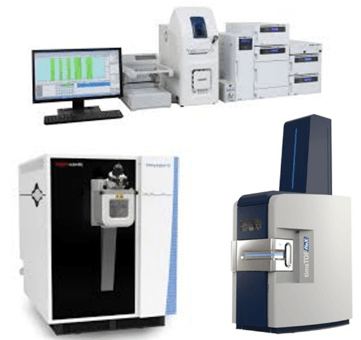Proteomics is a valuable tool for the discovery of biomarkers and therapeutic targets. Thus, it holds great promise for cancer prevention and treatment. Proteomics can be widely used in cancer-related fundamental science research. Proteomics technologies provide critical complements to gene sequencing, metabolites, and antibody-based technologies. Typical techniques for proteomics research include two-dimensional polyacrylamide gel electrophoresis (2D-PAGE), mass spectrometry, laser capture microdissection, etc.
Background of Cancer Proteomics
 Biological macromolecules, especially proteins, are highly dynamic molecules. Proteins can undergo a wide range of functional adjustments through various processes, such as hydrolytic degradation, and post-translational modification. Cancer research strategies based on proteomics can supplement or even sometimes provide more detailed and accurate information than sequencing – it can directly describe the abundance of proteins and analyze their functions. Similar to other high-throughput technologies, proteomics is a high-throughput technology that can obtain large amounts of data, which may contain differentially expressed pathological events in addition to normally expressed proteins. The object of proteomics research can be cancer individuals, or their systems, organs, tissues, cells, organelles, and biological fluids.
Biological macromolecules, especially proteins, are highly dynamic molecules. Proteins can undergo a wide range of functional adjustments through various processes, such as hydrolytic degradation, and post-translational modification. Cancer research strategies based on proteomics can supplement or even sometimes provide more detailed and accurate information than sequencing – it can directly describe the abundance of proteins and analyze their functions. Similar to other high-throughput technologies, proteomics is a high-throughput technology that can obtain large amounts of data, which may contain differentially expressed pathological events in addition to normally expressed proteins. The object of proteomics research can be cancer individuals, or their systems, organs, tissues, cells, organelles, and biological fluids.
Proteomics technologies can produce many data sets with potential diagnostic, prognostic, and therapeutic significance in human cancers. In-depth research from the perspective of cancer proteomics is expected to enhance our understanding of tumor pathogenesis, monitor and identify new cancer treatment targets.
Cancer Proteomics Analysis Provided by Creative Proteomics
With state-of-the-art platforms, Creative Proteomics provides comprehensive one-stop services for cancer research through proteomics technologies. Research technologies that we offer include two-dimensional polyacrylamide gel electrophoresis (2D-PAGE), mass spectrometry (MS), isotope-encoded affinity tag technology, reversed-phase protein arrays, and antibody microarrays.
Featured with high throughput and super-sensitivity, our protocols cover protein separation, characterization, identification, and quantification, to analyze protein bio-process including post-translational modifications such as phosphorylation and glycosylation. We help you answer various questions in cancer research through careful research design, experiment, and data mining to meet your various needs.
Key features and advantages
 Multiple platforms for high-throughput detection
Multiple platforms for high-throughput detection
Compatible with a wide range of samples
Accurate analysis of complex networks within cells, as well as interactions between the intercellular and extracellular environments
Scientifically and reasonably analysis of bioinformatics
Extensive experience in cancer proteomics
Efficient workflow and equitable price
Main services
Using the latest chromatography and mass spectrometry technology, Creative Proteomics provides:
- Comprehensive proteomics analysis of cancer cells, tissues and biofluids
- Cancer peptide and protein separation and purification
- Cancer protein identification and quantification
- Solid-phase peptide synthesis
- Inference of cancer translatome
- Analysis of cancer splicing and aberrant spliced proteins
- Discovery and analysis of protein post-translational modifications
- Functional analysis of cancer-related proteins
- Using cancer proteomics to facilitate drug discovery and development
- Protein phosphorylation site analysis and prediction
- Analysis of other protein modifications, such as acetylation, methylation, and ubiqitination
- Cancer-related protein-protein interaction analysis
- Stable isotope labeling of amino acids in cell culture (SILAC) for cancer proteomics
- Isobaric tags for relative and absolute quantification (iTRAQ) for cancer proteomics
Workflow

Bioinformatics Analysis
| Analysis Contents | Details |
|---|
| Systematic identification | Systematic proteomics to decipher the encoded protein networks that relate to cancer |
| Quantification | Determination of the number of proteins in specific samples, yielding information about the physiological differences among the samples. |
| Expressional proteomics | The quantitative study of cancer protein expression among samples that differ by some variable |
| Structural proteomics | Uncover the structure of proteins and to unravel and map protein-protein interactions |
| Functional annotation | Use sequence alignment tool for finding similarities of proteins that may link to tumorigenesis, and then annotating proteins based on that |
| Data visualization | Data visualization provides an accessible way to see and understand cancer-related proteins |
Creative Proteomics is one of the most trustworthy companies provide cancer research solutions, we are dedicated to providing the best strategies for your research. With state-of-the-art platforms, we provide fast and reliable cancer-related proteomics services. For additional information and other services that we provide, please feel free to contact us.
* For Research Use Only. Not for use in the treatment or diagnosis of disease.
Related Services:




